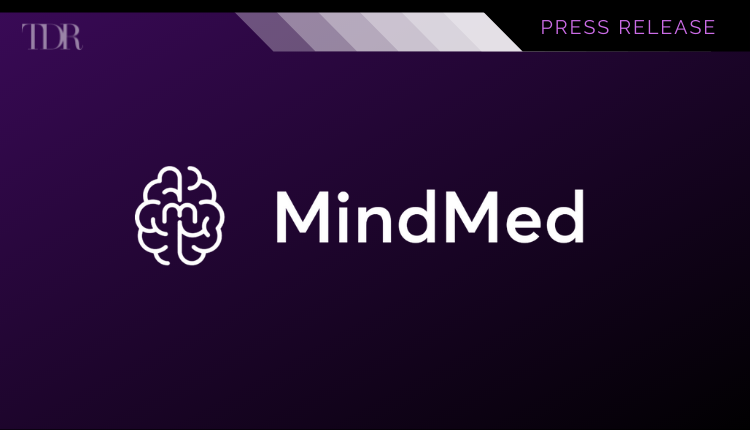
MindMed Collaborators Prof. Liechti and Dr. Holze Announce Positive Topline Data from Phase 2 Trial Evaluating LSD in Anxiety Disorders
Results from the placebo-controlled investigator-initiated trial, conducted at the University Hospital Basel (UHB), demonstrate the significant, long-lasting beneficial effects of LSD and potential to safely mitigate symptoms of anxiety and depression –
– Data further validates MindMed’s therapeutic approach and supports the clinical development of MM-120 for the treatment of Generalized Anxiety Disorder –
– Data was featured in an oral presentation on May 11, 2022 at 5:05am EDT / 10:05am BST –
Mind Medicine/MindMed (NASDAQ: MNMD) (NEO: MMED), a clinical stage biopharmaceutical company developing novel products to treat brain health disorders, today announced that Prof. Matthias Liechti and Dr. Friederike Holze, MindMed collaborators at University Hospital Basel (UHB), have released positive topline data from a Phase 2 placebo-controlled investigator-initiated clinical trial evaluating LSD in the treatment of anxiety disorders. These findings were presented in an oral presentation at London’s PSYCH Symposium on May 11, 2022.
The topline data demonstrate the significant, rapid, durable, and beneficial effects of LSD and potential to safely mitigate symptoms of anxiety and depression. LSD (200 µg) treatment resulted in significant and strong reductions of STAI-G scores 16 weeks after treatment in the between-subjects analysis (least square mean (± SE) change from baseline difference = -16.2 (5.8), 95% CI=-27.8 to -4.5, p=0.007). LSD was well-tolerated.
We are encouraged by the positive data showing that LSD produced rapid, strong and long-lasting reductions in anxiety and depression symptoms up to 16 weeks post treatment compared with a placebo. These results represent the highest quality research ever conducted with LSD in anxiety disorders and provide contemporary confirmation of the preliminary findings of the anxiolytic and antidepressant effects of LSD in over 500 patients to date.
Dr. Miri Halperin Wernli, Executive President of MindMed
Dr. Halperin Wernli continued, “The statistically significant, strong and long-lasting reductions in STAI-G scores, combined with similarly rapid and sustained responses in all secondary endpoint measurements, are extremely encouraging. These results further support MindMed’s clinical development strategy. We look forward to using these findings to advance our MM-120 program for the treatment of Generalized Anxiety Disorder.”
Prof. Matthias Liechti, co-primary investigator of the trial, commented, “While psychedelics including LSD have shown beneficial effects on reducing anxiety, there has still been a need for a deeper understanding of the mechanisms and the long-lasting effects by which psychedelics exert their therapeutic effects. Thus, we designed a robust, randomized, placebo-controlled clinical trial with a long follow-up period to extend the promising findings of previously conducted smaller, open-label trials. We are extremely encouraged by the results presented today, demonstrating the long-lasting and strong reduction in patients suffering from anxiety. We look forward to reporting additional analyses and further investigating the therapeutic potential of LSD for patients suffering from anxiety disorders.”
Details on the data presentations:
The presentation, titled “LSD as a Treatment for Anxiety Disorders: New Evidence of Efficacy,” was delivered by Dr. Friederike Holze and Prof. Dr. Matthias Liechti, co-primary investigators of the trial and MindMed collaborators at University Hospital Basel (UHB).
Key data and conclusions from the topline efficacy analysis featured in the PSYCH Symposium presentation include:
- Primary Endpoint: LSD treatment resulted in significant and strong reductions of STAI-G scores 16 weeks after treatment in the between-subjects analysis (least square mean (± SE) change from baseline difference = -16.2 (5.8), 95% CI=-27.8 to -4.5, p=0.007).
- A clinical response (reduction in STAI-G scores ≥30%) was observed in 65% (13/20) patients in the LSD arm and in 9% (2/22) patients in the placebo arm (p=0.003).
- Effects were maximal 2 weeks after the second LSD session and sustained up to 16 weeks.
- All secondary endpoint measurements, including the HAM-D-21, BDI, and SCL-90-R, showed similarly rapid and sustained responses consistent with a lasting treatment effect on anxiety, depression, and general psychiatric symptomatology.
- Acute positive effects or mystical experiences significantly correlated with long-term therapeutic outcomes.
- LSD was well-tolerated: only one SAE was considered related to treatment and consisted of acute transient anxiety and delusions during an LSD session. There were no recorded instances of treatment-emergent suicidal ideation with intent, suicidal behavior or intentional self-injury.
About the Phase 2 Investigator-Initiated Clinical Trial
The investigator-initiated, two-center, clinical trial was a double-blind, placebo-controlled, Phase 2 trial that investigated the safety and efficacy of LSD for the treatment of anxiety disorders. The trial enrolled 46 patients either suffering from anxiety symptoms in life-threatening illnesses or with an anxiety disorder without severe somatic illness. Patients were randomly assigned to two sessions with either oral LSD (200 µg) or placebo administration over a trial duration of 52 weeks per patient. The primary efficacy endpoint was reduction in anxiety symptoms 16 weeks after the last LSD or placebo administration. The primary outcome measure was the State Trait Anxiety Inventory (STAI) global score, which is used to assess the severity of anxiety symptoms. Secondary outcome measures included improvements in Hamilton Depression Scale (HAM-D), Beck Depression Index (BDI), and several other major psychiatric symptoms (Symptom-Check-List-90-R) scores. For additional information on this trial see clinicaltrials.gov [NCT03153579].
MindMed supports the UHB Liechti Lab in conducting investigator-initiated trials for LSD and other novel therapies and has exclusive access and rights to the data generated by these studies.
To view the original press release in its entirety click here



